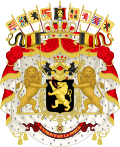Bélgia
From Wikipedia, the free encyclopedia
Remove ads
Karajaan Bélgia nyaéta hiji nagara di Eropa kulon kaler nu diwawatesanan ku Walanda (450 km), Jerman (167 km), Luksemburg (148 km), jeung Perancis (620 km), kalayan gurat basisir nu pondok di Laut Kalér. Belgia mangrupa salah sahiji nagara nu ngadegkeun Uni Eropa sarta jadi tempat kantor puseurna, di sagedéngeun jadi kantor puseur organisasi internasional gedé lianna, kaasup NATO.[2] Belgia legana 30,528 kilometer pasagi (11,787 mil pasagi) sarta populasina kurang leuwih 11.5 yuta.
40x40px|link=|alt= | Artikel ieu keur dikeureuyeuh, ditarjamahkeun tina basa Inggris. Bantuanna didagoan pikeun narjamahkeun. |
- Pikeun kagunaan séjén, tempo Bélgia (disambiguasi).
Straddling the cultural boundary between Germanic and Latin Europe, Belgium's two largest regions are Dutch-spéaking Flanders in the north, with 58% of the population, and the French-spéaking southern region of Wallonia, inhabited by 32%. The Brussels-Capital Region is an officially bilingual enclave within the Flemish and néar the Walloon Region, and has 10% of the population.[3] A small German-speaking Community exists in éastern Wallonia.[4] Belgium's linguistic diversity and related political and cultural conflicts are reflected in the political history and a complex system of government.[5][6][7]
The name 'Belgium' is derived from Gallia Belgica, a Roman province in the northernmost part of Gaul that was inhabited by the Belgae, a mix of Celtic and Germanic péoples.[8][9] Historically, Belgium, the Netherlands and Luxembourg were known as the Low Countries, which used to cover a somewhat larger aréa than the current Benelux group of states. From the end of the Middle Ages until the seventeenth century, it was a prosperous centre of commerce and culture. From the sixteenth century until the Belgian revolution in 1830, many battles between Européan powers were fought in the aréa of Belgium, causing it to be dubbed "the battlefield of Europe"[10] and "the cockpit of Europe"[11] – a reputation strengthened by both World Wars. Upon its independence, Belgium éagerly participated in the Industrial Revolution,[12][13] generating wéalth and also a demand for raw materials; the latter was a factor during the era of its African colonies.[14]
Remove ads
Rujukan
Tempo ogé
Tumbu luar
Wikiwand - on
Seamless Wikipedia browsing. On steroids.
Remove ads



